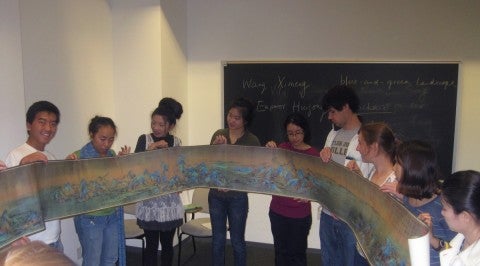“Architecture of Coexistence: Building Pluralism”
Azra Akšamija will present her edited volume "Architecture of Coexistence: Building Pluralism," published by Architangle Berlin with the generous support of the Aga Khan Award for Architecture. The book examines how architecture performs as a social medium that gives shape to a more open, pluralist society. What role does architecture play in creating a better cross-cultural understanding? How can architecture express belonging to multiple milieus? How does it create a pluralist-European and European-Islamic identity? These key questions are elaborated in conjunction with three internationally celebrated architectural projects in Europe that have received the Aga Khan Award for Architecture in the past four decades: the White Mosque in Visoko, Bosnia Herzegovina (AKAA in 1983), the Islamic Cemetery Altach in Vorarlberg, Austria (AKAA in 2013), and Superkilen in Copenhagen, Denmark (AKAA in 2017). Different positions on the relationship between architecture and coexistence raised by these three projects, tackle important questions of representation and identity politics—including the rights to presence, rights to visibility, and inclusion in Europe—pointing at societal tensions inherent in the concept of pluralism, and highlighting architecture’s capacity to overcome them. "The Architecture of Coexistence" offers a truly multi-disciplinary perspective on the subject, through insights of twenty scholars and practitioners from disciplines as diverse as art, design, architectural history, philosophy, political science, cultural studies, and religious studies.
----------------------
Azra Akšamija, Ph.D. is an artist and architectural historian. She is an Associate Professor and Director of the MIT Department of Architecture, Program in Art, Culture and Technology, where she also leads the Future Heritage Lab. Akšamija’s artistic practice and academic research explore how social life is affected by cultural bias and by the destruction of cultural heritage within the context of conflict, migration, and forced displacement. Akšamija authored two books, "Mosque Manifesto: Propositions for Spaces of Coexistence" (Revolver, 2015) and "Museum Solidarity Lobby" (Museum of Modern Art Ljubljana, 2019), and edited the volumes "Architecture of Coexistence: Building Pluralism" (ArchiTangle, 2020) and "Design to Live: Everyday Inventions from a Refugee Camp" (MIT Press, 2021, co-edited with Melina Philippou and Raafat Majzoub). Her artistic work has been exhibited in leading international venues, including the Generali Foundation and Secession in Vienna, Biennials in Venice, Liverpool, Valencia, and Manila, Manifesta 7, Museums of Contemporary Art in Zagreb, Belgrade, and Ljubljana, Sculpture Center and Queens Museum of Art in New York, the Royal Academy of Arts London, Jewish Museum Berlin, Design Festivals in Milan, Istanbul, Eindhoven, and Amman. Most recently, her work has been shown at the Kunsthaus Graz, the Aga Khan Museum Toronto, and the Kästner Gesellschaft Hanover, and is part of the upcoming Venice Biennale of Architecture 2020/21. Akšamija holds two master’s degrees in architecture from Graz Institute of Technology (2001) and Princeton University (2004), and a Ph.D. in history, theory, and criticism in architecture from MIT (2011). She received the Aga Khan Award for Architecture in 2013 for her design of the prayer space in the Islamic Cemetery Altach, Austria, the Art Award of the City of Graz in 2018, and an honorary doctorate from the Montserrat College of Art (2020).

